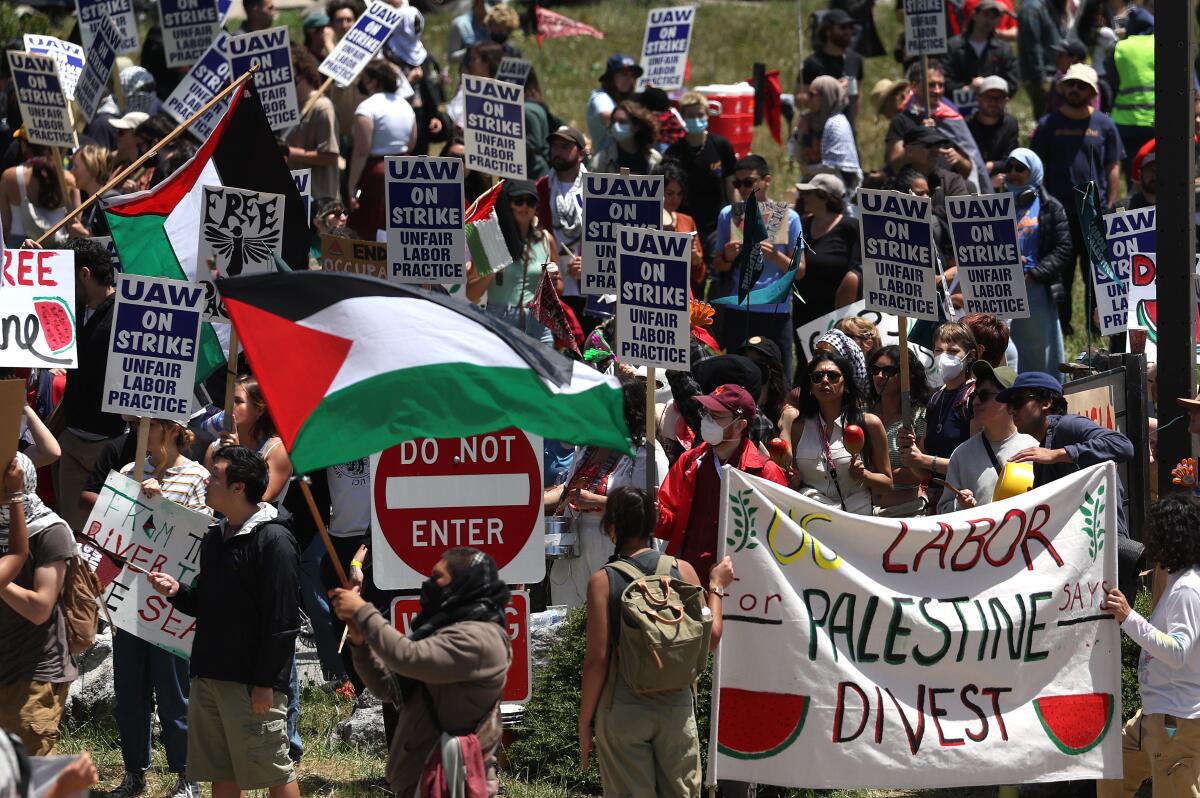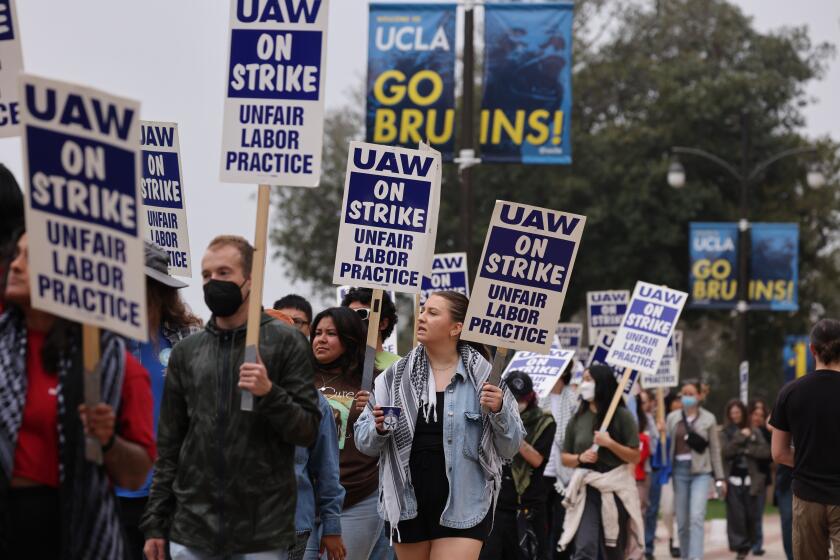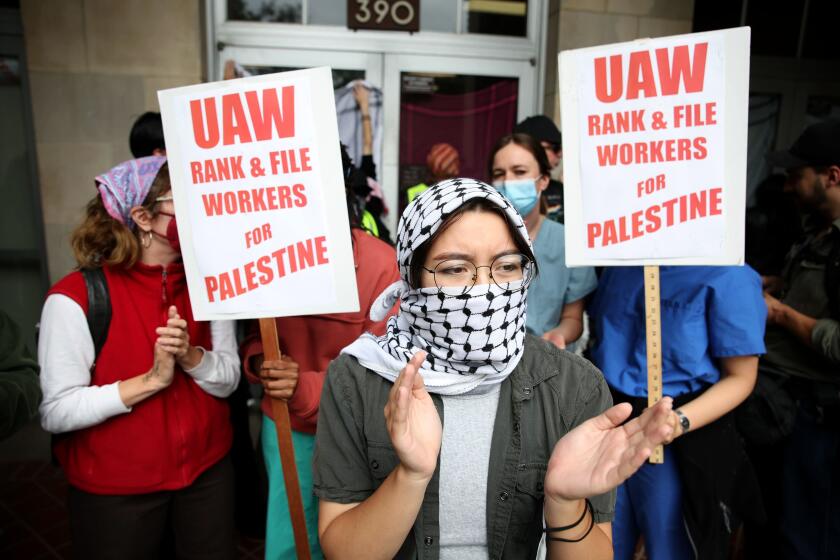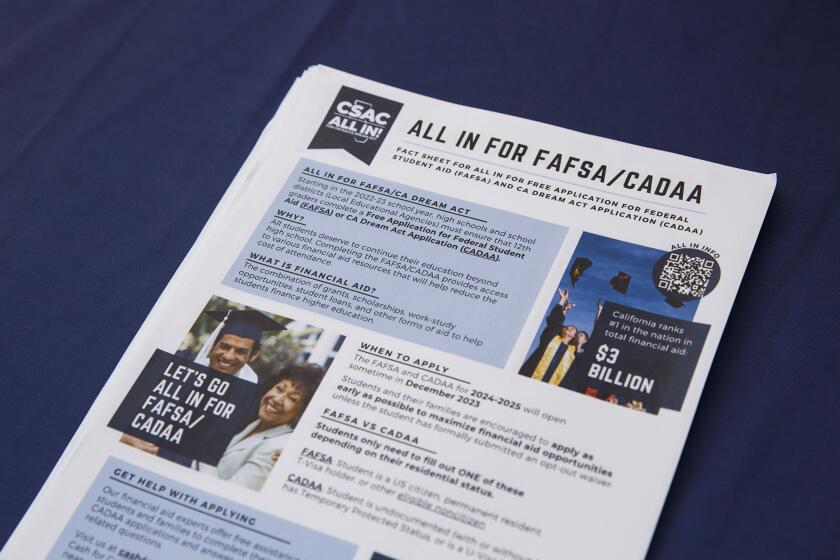How pro-Palestinian protests led to a massive UC strike, injecting new fuel into antiwar activism

Academic workers on strike at UCLA, UC Davis and UC Santa Cruz chanted this week about “workers rights under attack,” referring to pro-Palestinian union members who were arrested and suspended after recent protests. Some on the picket line wore kaffiyehs, traditional scarves used to express solidarity with Palestinians.
Others waved Palestinian flags, shouting, “free Palestine,” and pressed union demands that the University of California divest from ties to Israel and the war in Gaza and grant all protesters amnesty from campus discipline.
The merger of union accusations alleging workplace mistreatment with the goals of a wider pro-Palestinian campus movement has not only injected new fuel into antiwar activism, but also become a challenging and potentially volatile labor dispute at three of the most prominent public universities in the nation.
The unique demands of United Auto Workers Local 4811 have labor experts debating over how the widely watched strike — which has canceled some classes, blocked parking lots and prompted protests that disrupted classes — could come to a precedent-setting end.
While unions typically strike over pay demands or benefit improvements during contract negotiations, this walkout is far different. The union alleges that its rights have been violated. The university accuses union members of manipulating labor law to support political goals unrelated to everyday work and says it is breaking a no-strike agreement in its contract.
The escalating situation — union leaders said Friday that strikes would expand next week to UC San Diego, UC Santa Barbara and UC Irvine — could have a lasting impact on how one of the country’s largest university systems deals with one of the biggest higher education unions.
That’s one reason why UC leaders said they are asking the state labor authority — the Public Employment Relations Board, or PERB — to order the union to halt its strike during a critical ending period of the term with finals and grading at hand.
“If what UAW has put together creates a precedent and a framework that PERB says is allowable, that will change all of our understanding about negotiations and what the framework looks like for labor,” said Melissa Matella, UC’s associate vice president for systemwide labor relations. “Because if, for example, this is allowed, and if PERB says this is a lawful strike, then the University of California, the state of California, all of the public employers in the state of California will need to understand that labor peace is not guaranteed during contracts, even with a no-strike agreement.”
What led to the strike
The 48,000-member union includes graduate teaching assistants, researchers and other academic workers at UC’s 10 campuses and the Lawrence Berkeley National Laboratory who lead discussion groups, grade papers and administer exams, among other responsibilities.
Workers at UCLA and UC Davis are on strike over allegations their rights were violated by UC’s actions against pro-Palestinian protests.
They walked off the job alleging that their free speech rights to speak out about their workplaces were violated when UC leaders called in police to remove pro-Palestinian encampments at several campuses, resulting in arrests and suspensions. They also contend the university violated their rights as workers by failing to protect them when a violent mob attacked protesters at UCLA, including union members, and police took hours to intervene.
The union bases the charges on the experiences of dozens of members who protested at UCLA, UC San Diego and UC Irvine. The union also says universities unilaterally changed their job conditions when classes were moved online amid protests instead of bargaining over those work-related decisions.
The UAW filed unfair labor practice charges with the state labor board May 10.
On May 15, 79% of the 19,780 members who cast ballots voted to authorize the strike. The total voter participation amounted to 41% of all union members — meaning 33% of the total membership approved the authorization. The rates were significantly lower than a 2022 strike vote, in which 76% of members voted and 97% approved of a strike that led to increases in wages and benefits.
“It was always likely that the strike vote and participation would be lower than in the 2022,” said John Logan, a professor in the department of labor and employment studies at San Francisco State University. “These things do matter, but it’s arguably a respectable turnout and maybe even a higher than expected strike authorization, given that it’s... not a strike over pay and benefits.”
The university contends that the current strike is illegal because the union has a valid contract with a no-strike clause. Last week, the state labor board denied UC’s request to halt the strike on grounds that it was causing irreparable harm to students, research and operations.
The university doubled down on its injunction request Wednesday, filing evidence citing the spread of strikes this week to UCLA and UC Davis and arguing that union members have disrupted classes and access to campuses. The strikes, it said, were “to the detriment of tens of thousands of students, faculty and other campus community members.”
In a response filed Thursday evening, the union said “the university has failed yet again” to prove its point and that its allegations are “speculative” and “unsubstantiated.” In some cases, the UAW put the blame for campus disruptions and blockages on pro-Palestinian undergraduates or other nonunion groups.
Union leaders also say the no-strike provision is irrelevant to the alleged violations they are claiming.
The state board is expected to again decide on the matter soon.
“We are urging the university to come to an agreement as soon as possible so we can resume teaching courses and research,” UAW 4811 President Rafael Jaime said.
Matella said in an interview that strikes were the wrong way to go.
UC officials claim the strike was illegal because of a no-strike clause, but the state labor board says that isn’t enough to order a stop to the walkout.
“We have many arbitrations pending with UAW right now. So they absolutely have other mechanisms for resolving this conflict,” said Matella. “They’ve just chosen not to use them.”
Other academic worker unions, including those at USC, Harvard and New York University, have also filed unfair labor practice charges against their employers related to worker treatment during pro-Palestinian protests.
Union demands
The union is launching campus strikes one by one and has threatened to call on members on all campuses to strike through June 30.
Some of the union’s demands, such as amnesty from discipline for all people who took part in protests — union members or not — are relatively straightforward.
Others, including a demand that the University of California divest billions of dollars from “weapons manufacturers, military contractors, and companies profiting from Israel’s war on Gaza” are harder because UC leaders have declared opposition to divestment that targets Israel. Individual campuses have been more favorable to the demands — to a degree.
In an agreement with protesters to end their encampment at UC Berkeley, outgoing Chancellor Carol Christ said she supported examining Berkeley’s investments in “a targeted list of companies due to their participation in weapons manufacturing, mass incarceration, and/or surveillance industries” and would push University of California regents on divestment.
Pro-Palestinian protesters at UC Berkeley removed their encampment after talks with the university, which said it will consider their divestment demands.
In a similar pact at UC Riverside, Chancellor Kim Wilcox said he would form a task force to “explore the removal of UCR’s endowment from the management of the UC Investments Office, and the investment of said endowment in a manner that will be financially and ethically sound for the university with consideration to the companies involved in arms manufacturing and delivery.”
Another union demand is for the researchers it represents to receive transitional funding so they can opt out from “funding sources tied to the military or oppression of Palestinians.” That would include those working for departments that were given portions of the $333 million the University of California received last year from the Department of Defense.
Legal debate
The strike reflects a growing national labor movement in which younger, liberal workers are increasingly unionizing and taking political stands, said David Lewin, a professor emeritus of management, human resources and organizational behavior at the UCLA Anderson School of Management.
Unions have long played a role in elections and even supported foreign policy positions, Lewin said, “but this is different.”
“Striking workers are taking a risk in supporting one side of a two-party conflict. It looks opportunistic because you have employees of the university striking at the end of a quarter or semester when final exams are being given, grades are due and people have to graduate. It puts a lot of pressure on the university.”
Time is running out for a resolution, Lewin said, because “as soon as most students are gone for the summer, the union’s leverage significantly decreases.”
He thinks the university’s claim that the strike is illegal is “stronger” than the union’s argument over free speech violations because “there are a lot of interpretations of what free speech means,” including protest rights that UC currently affords students and workers who continue to rally in support of Palestinians.
Some other labor experts take a different view.
The university’s messaging “is meant to intimidate the workers into not going on strike,” said Tobias Higbie, a UCLA professor of history and labor studies. “I wish the University of California would be a different type of employer, but apparently it’s not the way they want to go with this.”
Noah D. Zatz, a UCLA professor of law and labor studies, said union members were within their rights to stop working. Unfair labor practice strikes have precedent, he said, and go beyond “seemingly all-inclusive” no-strike clauses in contracts. That’s because because they rest on a union’s allegations that the employer violated labor law — in this case, California’s Higher Education Employer-Employee Relations Act — and not simply contract terms, he said.
UC “expresses incredulity that this has anything to do with employment and work. That’s strange considering the university is a massive employer,” Zatz said. “You have people who are employees engaging in protest activity on employer’s grounds suffering at the hands of their employer. The idea that this has nothing to do with employer relationships is very hard to take.”
What workers say
That’s the position workers promoted this week during pickets at UCLA.
Speaking at a rally, union member Yunyi Li called for “no business as usual” until UC leaders face up to alleged “unlawful actions.”
“UC can be on the right side of history by taking accountability for their actions by coming to an agreement with encampment organizers over amnesty, divestment and policing,” Li said to a crowd of hundreds gathered near the Bruin Bear statue. “We are all here because no worker or student should be forcefully expelled from their workplace or their school for peaceful protest, especially in the fight for something as righteous and as fundamental as a free Palestine.”
At UC Irvine, where no strike has been called, union member Mark Gradoni said he supported the members rallying elsewhere. Gradoni, a doctoral student in the history department, was arrested May 15 when police broke up a pro-Palestinian building occupation and encampment in Irvine.
On May 21, the university notified Gradoni of his interim suspension for violating campus policies on disruption and disorderly or lewd conduct, among others. A letter banned Gradoni from campus, in housing, or where any university programming is taking place and directed him to teach remotely.
“It’s pretty clear that the university feels threatened by students, faculty and workers asking for greater transparency and a greater stake in shaping our terms of employment and the way our university works,” Gradoni said.
Is there a way out?
Jaime, the union president, said all of the union’s demands were important but singled out one that he said would “do a lot to lower the pressure.”
“They could start by dropping the charges against workers — police and discipline charges,” he said. “Both completely have the potential to derail people’s lives.”
On divestment, Jaime pointed to deals struck at UC Berkeley and UC Riverside as “models” but said it was “too early to tell” what the results in those cases would be.
Amnesty from discipline, such as suspensions, has been promised to protesters at several universities across the U.S. as a condition of taking down pro-Palestinian encampments.
Mediation between UC and the UAW is ongoing, part of a multistep process that could drag far beyond the end of this quarter, which is mid-June at several campuses.
UC has also filed its own unfair labor practice charge against the union, saying it violated its contract by striking.
Last week, the labor board issued a complaint against the union based on those allegations. The complaint sets in motion a process under which both sides will make their case. The complaint indicates the labor board’s view that, if the facts presented by UC are shown to be accurate, then the strike could be ruled illegal. The case is slow-moving — both sides have until mid-June to submit paperwork — and does not itself halt the strike.
Times staff writers Suhauna Hussain, Grace Toohey and Caroline Petrow-Cohen contributed to this report.
More to Read
Sign up for Essential California
The most important California stories and recommendations in your inbox every morning.
You may occasionally receive promotional content from the Los Angeles Times.














